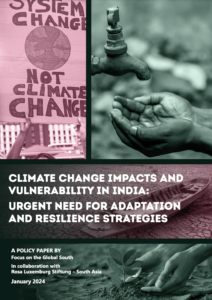31/01/2024
Under: Climate & Environment, India, Reports
In this Workshop experts, academics, think tanks, civil society organizations, peoples’ movements, NGOs and activists came together to work towards promoting Adaptation as a national, state and local agenda. The Workshop was organised by Focus on the Global South in collaboration with All India Peoples Science Network on September 2-3, 2023 in Chennai, Tamil Nadu, India.
Report compilation: Supriya Vohra
India is witnessing extreme weather especially rainfall, related urban flooding and landslides, heat waves, changes in the monsoons and patterns of precipitation, changing patterns of agriculture especially horticulture, rapidly melting glaciers, increased frequency and intensity of cyclones, river floods, coastal erosion, rise in sea temperature and acidification, sea-level rise in deltaic regions, and growth of vector-borne and zoonotic diseases.
All these are causing large-scale destruction of infrastructure, habitat and ecosystems especially affecting deprived sections, severe impact on incomes, and mounting and recurring losses of homes, livelihoods and survival.
Much attention has been paid to mitigation, i.e. reducing greenhouse gas (GHG) emissions driving climate change. However, adaptation measures to cope with the impacts and build resilience have lagged far behind requirements. The UNFCCC deliberations have largely left Adaptation to individual countries to tackle domestically. Adaptation measures are crucial for tackling climate impacts and to build resilience across sectors, region and communities.
The Report discusses and draws attention to major trends in climate impacts in different parts of the country and in different socio-economic spheres, and collates possible well-round multi-dimensional Adaptation measures.
Published by: Focus on the Global South with support from the Rosa Luxemburg Stiftung – South Asia
*The content of the publication is the sole responsibility of the partner and does not necessarily reflect a position of RLS.






